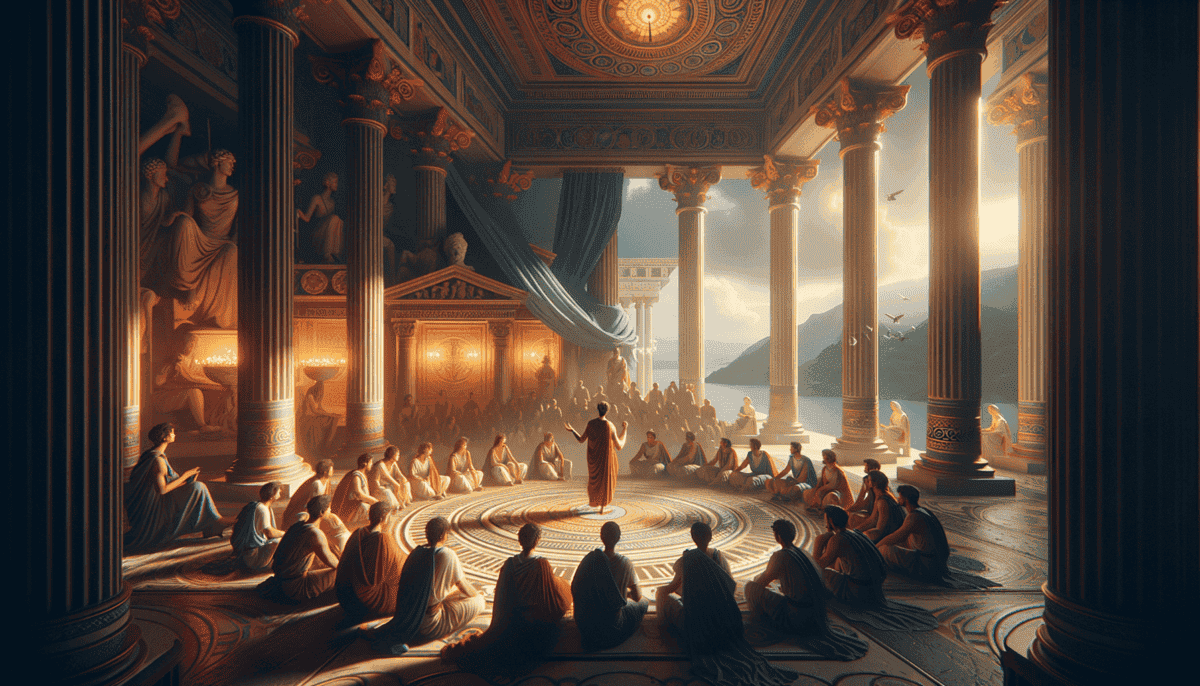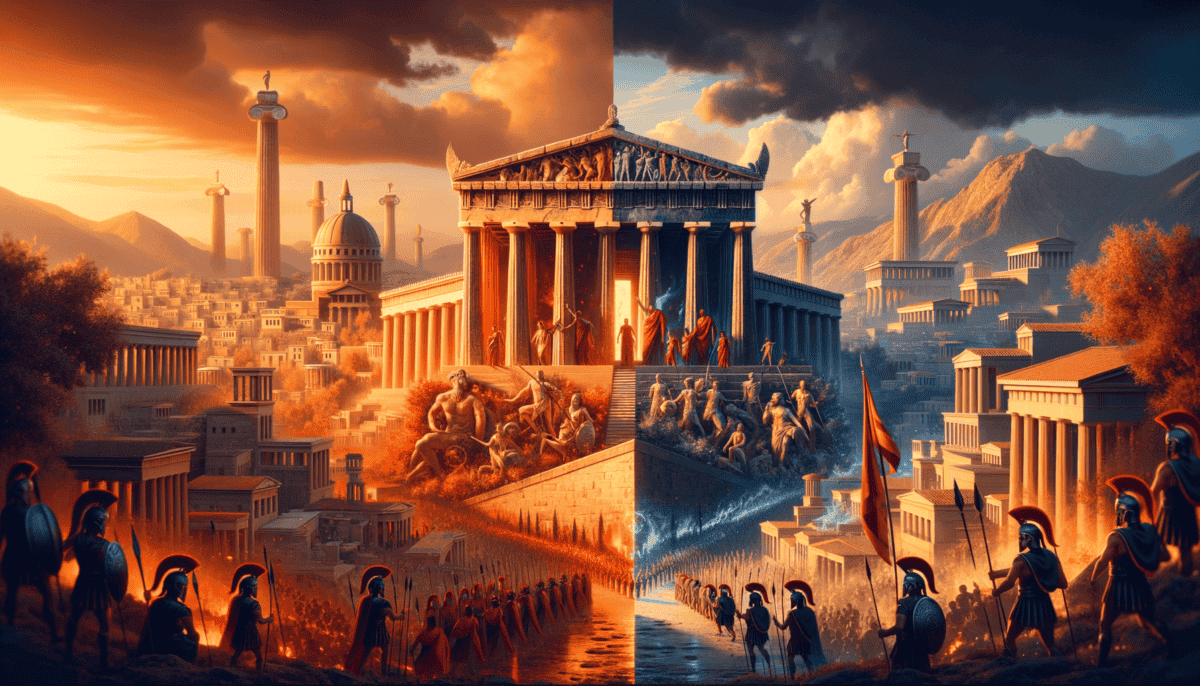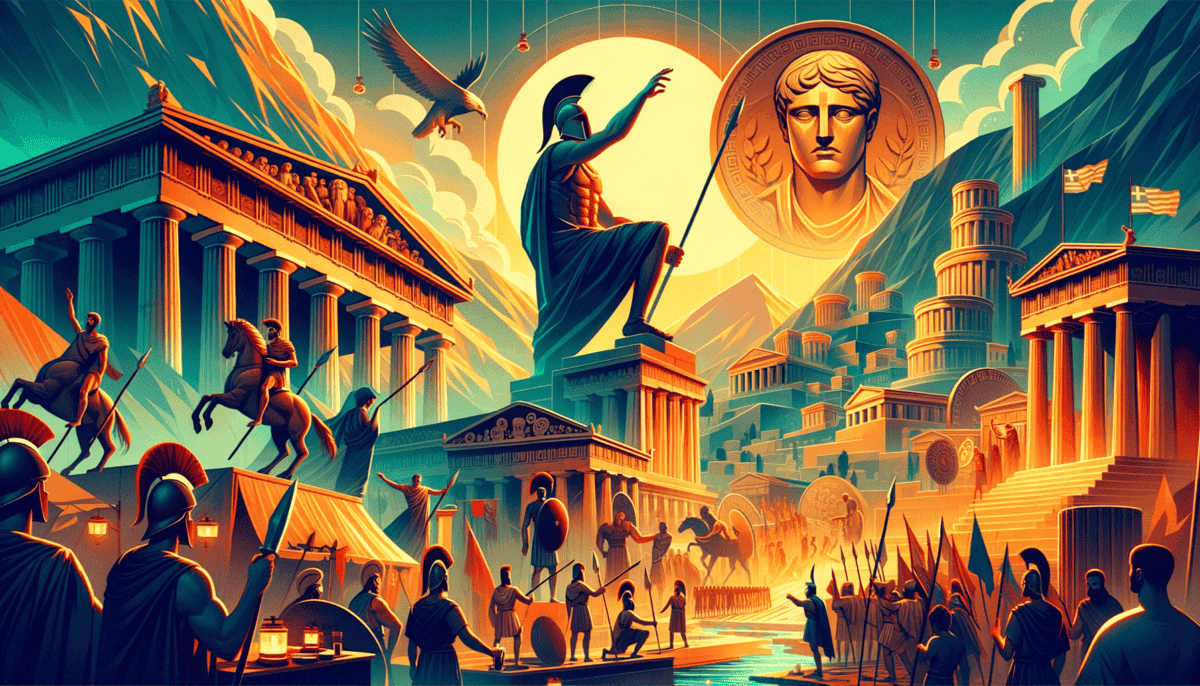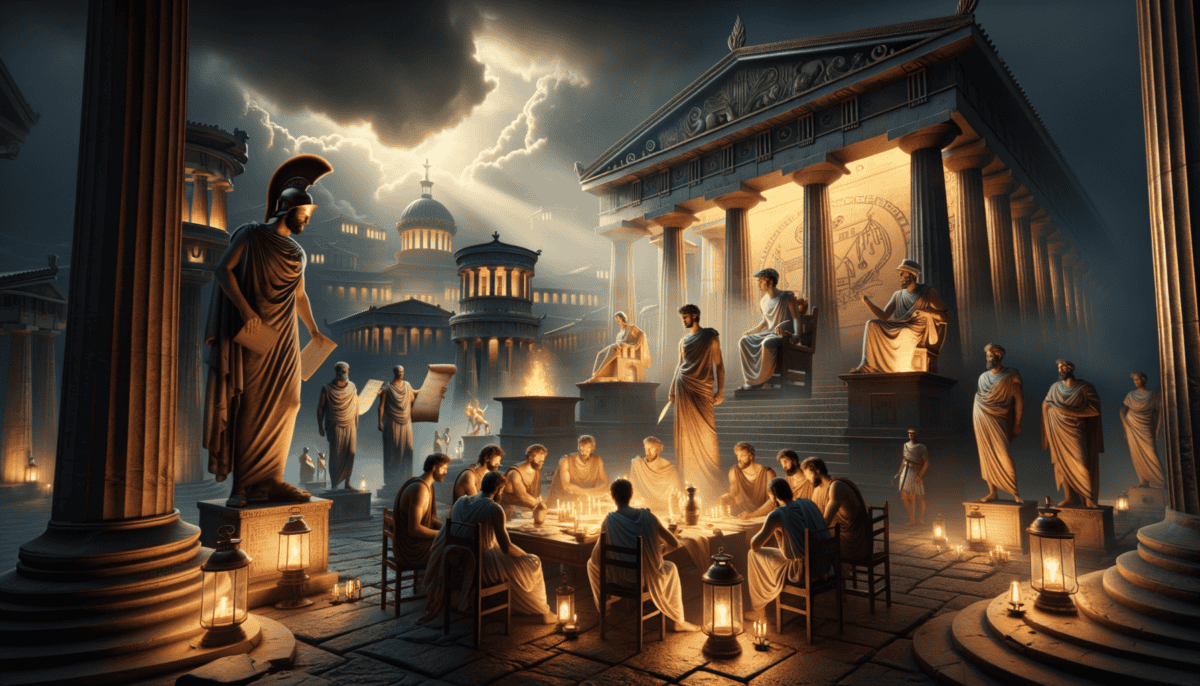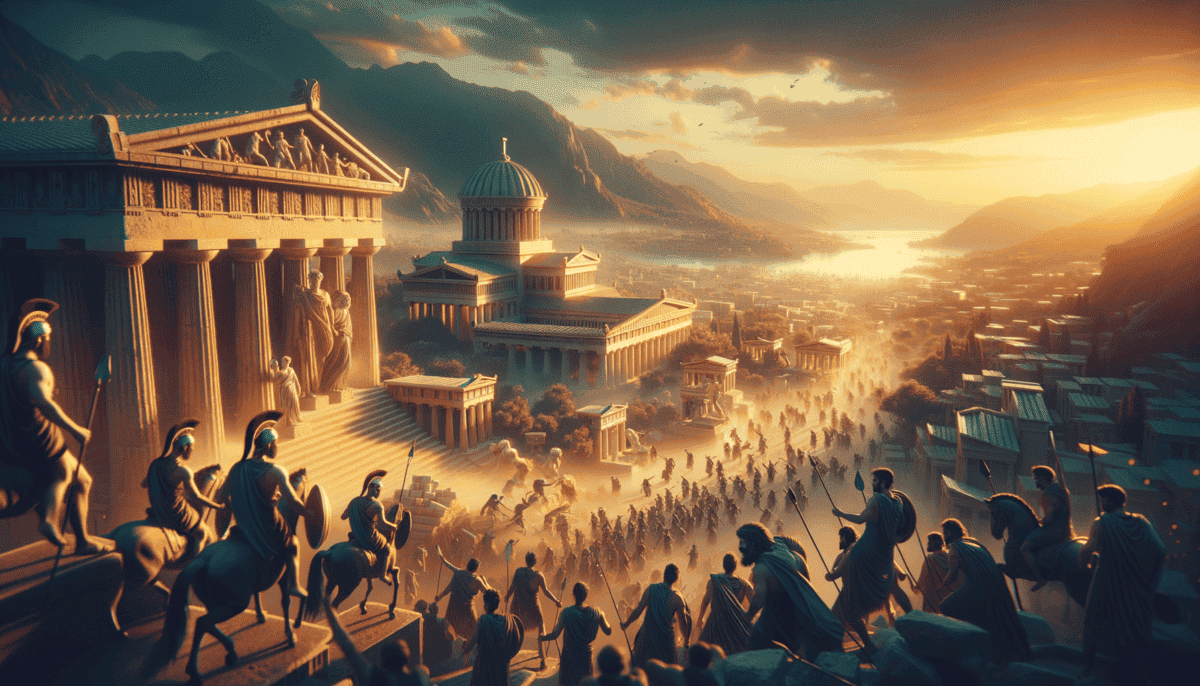Seeds of Power
Long ago, in a land called Greece, there was a beautiful city named Athens. The sun shone bright on its white buildings, and people rushed through busy streets. But not everyone in Athens was happy. ️
"Father, why do some people have so much while we have so little?" young Theron asked, watching wealthy merchants pass by their small pottery shop.
His father, Nikias, sighed as he shaped clay on his wheel. "That's just how things are in Athens, my son. The rich make the rules, and we must follow them."
Life Under Draco’s Laws
The city had very strict laws made by a man named Draco. His rules were so harsh that even stealing a loaf of bread could get someone in big trouble!
“Draco’s laws are written in blood, not ink,” people would whisper in the marketplace.
Poor farmers worked hard in their fields, but they still couldn't pay their debts. If they couldn't pay, they could become slaves! This made many people very angry.
The Growing Storm
In the busy marketplace, different groups of people started talking about change:
- The poor farmers wanted fair laws
- The traders wanted more chances to make money
- The nobles wanted to keep their power
- The craftsmen wanted better lives
Little Theron noticed more and more people gathering in the streets. They would talk in angry voices about making things better.
"Look, father!" Theron pointed to a crowd one day. "Why are all those people yelling?"
"They want things to change," Nikias explained. "They're tired of the harsh rules."
A City Ready for Change
In the noble houses on the hill, rich people were worried. They could see that the poor people were getting angry. Some smart nobles knew they needed to make changes before things got worse.
"Something big is coming," an old woman told Theron as she bought a pot from their shop. "Athens cannot stay this way forever."
The air in Athens felt heavy with change, like right before a big storm. Poor people were getting braver about speaking up. Rich people were getting nervous. Everyone could feel that things were about to change in a big way.
That night, as Theron helped his father clean up the shop, he asked, "Will things get better, father?"
Nikias looked out at the darkening streets of Athens. "Change is coming, my son. But whether it will be good or bad, only the gods know."
The story of Athens was about to take an exciting turn. Some people would try to take power for themselves. They would be called tyrants, and they would change Athens forever.
The city held its breath, waiting to see what would happen next…
The Rise of Pisistratus
A new face appeared in Athens – a man named Pisistratus. He was smart and knew how to make people like him.
“Look at that man giving away free bread!” Theron tugged at his father’s sleeve. They watched as Pisistratus handed out food to hungry families in the marketplace.
“That’s Pisistratus,” Nikias whispered. “He says he wants to help the poor people.”
A Clever Plan
Pisistratus was very tricky. One day, he did something that shocked everyone. He rode into Athens in a chariot, covered in cuts and bruises!
“Help me!” he cried. “The nobles tried to hurt me because I stand up for the poor!”
The people of Athens felt bad for him. They gave him guards to protect him. But this was exactly what he wanted! Now he had soldiers to help him take over the city.
Three Times Lucky
Pisistratus tried to take over Athens three times:
- First try: He used his fake injuries
- Second try: He made friends with rich people
- Third try: He finally won and became the ruler
“Father, why do people like him so much?” Theron asked, watching crowds cheer for Pisistratus.
“He makes big promises,” Nikias explained. “He tells farmers he’ll give them land. He tells poor people he’ll make them rich. He tells everyone what they want to hear.”
Making Friends and Keeping Power
Pisistratus was smart about staying in charge. He made Athens beautiful with new buildings. He started big festivals where everyone could have fun. He even let people keep their farms and jobs.
“Look, Theron!” his father pointed to new workers in the street. “He’s giving jobs to poor people. Maybe things will get better.”
“A full stomach makes a happy citizen,” Pisistratus would often say.
But not everyone was happy. The noble families were angry because they lost some of their power. They whispered in their big houses, planning ways to fight back.
A City Changed
Athens was different now. There were new temples, more festivals, and lots of art. Poor people had more food and jobs. But there was a price – everyone had to do what Pisistratus said.
“Is he a good ruler or a bad ruler?” Theron asked his father one evening.
Nikias thought carefully before answering. “It’s not that simple, son. He helps people, but he also wants all the power for himself. Sometimes good things can come from people who aren’t perfect.”
The sun set over Athens, casting long shadows across the new buildings. Pisistratus had changed their city forever, but this was just the beginning of the story of tyrants in ancient Greece…
Rules of Power
The morning sun rose over Corinth, where a young boy named Lycus watched his city change. A new ruler named Cypselus had taken control.
“Why are the nobles running away?” Lycus asked his mother as they watched wealthy families leave the city.
“Cypselus doesn’t want anyone to challenge him,” she explained. “He came from a poor family, just like us.”
The Snake and the Eagle
People told a special story about baby Cypselus. When he was born, the nobles tried to hurt him. But bees made honey to feed him and keep him safe!
“The gods protected him,” whispered the old storytellers. “They knew he would be important one day.”
A Different Kind of City
While Corinth had Cypselus, Sparta was very different. They had two kings instead of one! They shared power with a group of older, wise people.
“Look how the Spartan children train,” Lycus pointed as they watched young warriors exercise. “They’re so strong!”
His mother nodded. “Sparta believes in making everyone tough and brave. They don’t let one person have all the power.”
The Art of Control
Back in Corinth, Cypselus knew how to keep people happy:
- He built beautiful temples
- He gave money to poor families
- He made sure everyone had enough food
- He protected traders and artists
“Our city is getting prettier,” Lycus said, watching workers build a new temple.
Two Ways to Rule
Lycus’s family visited Sparta one day. Everything was different there! The streets were plain, not fancy like Corinth.
“Why don’t they have nice buildings?” Lycus asked.
“Sparta cares more about being strong than being pretty,” his mother said. “They think fancy things make people weak.”
The People’s Voice
In Corinth, Cypselus walked among the people every day. He listened to their problems and tried to help. But in Sparta, important decisions were made by many people talking together.
“A city is strong when its people work together,” said a Spartan teacher to his students.
As the sun set, Lycus thought about the two different cities. Corinth was beautiful but controlled by one man. Sparta was tough but shared power among many.
“Which way is better?” he asked his mother.
She smiled wisely. “That’s what everyone is trying to figure out, my dear. That’s why our story isn’t over yet…”
The Tools of Power
The sun rose over Athens, where a young girl named Thea watched the city guards march through the streets. Her father, a merchant, whispered about how rulers stayed in charge.
“Look how the tyrant keeps control,” he said softly. “It’s like a spider’s web.”
The Golden Rules
Thea watched as the ruler’s helpers gave out bread to hungry people. “Why does he give away food?” she asked.
“Happy people don’t fight back,” her father explained. “It’s like feeding a guard dog to keep it friendly.”
Stories and Songs
In the marketplace, singers told tales about the ruler’s greatness:
“He was chosen by the gods!”
“His wisdom brings us wealth!”
“Our city is strong because of him!”
Musicians played happy songs about life under the tyrant’s rule. Artists made beautiful statues of him looking brave and kind.
Friends in High Places
Thea noticed rich people getting special treats from the ruler. “Why does he give them gifts?” she wondered.
“Because powerful friends help keep you safe,” her mother explained. “It’s like having big brothers to protect you at school.”
The Whisper Network
The ruler had helpers everywhere. They listened to what people said and reported back to him.
“Walls have ears,” Thea’s father warned. “Be careful what you say in public.”
Even children knew to watch their words. One boy got in trouble just for making fun of the ruler’s new statue!
Smart and Scary
Thea saw guards take away a man who spoke against the ruler.
“What happened to him?” she asked, worried.
“Some rulers use fear to keep people quiet,” her mother said. “Like how a loud bark keeps other dogs away.”
The Money Game
The ruler built new temples and roads. He made sure traders could sell their goods safely.
“When people have jobs and money, they don’t complain as much,” Thea’s father explained. “A full belly makes for a quiet mouth.”
The Hidden Cost
But Thea noticed something strange. People smiled less. They whispered instead of laughing loud.
“Fear is like a heavy blanket,” her grandmother said. “It keeps everyone warm, but it’s hard to move freely.”
That night, Thea drew pictures in the sand. She drew a beautiful bird in a golden cage.
“What’s your drawing about?” her mother asked.
“It’s about us,” Thea said. “We have nice things, but something feels missing…”
Her mother hugged her tight. “You’re starting to understand the big puzzle of power, little one. And that understanding might change everything…”
Winds of Change
The morning air felt different in Athens. Young Thea noticed people gathering in small groups, whispering with hope in their eyes.
Brave Words
At the marketplace, a man named Solon stood on a wooden box. His voice was strong and clear.
“We deserve to be free! Our children deserve better than fear!”
People stopped to listen. Guards watched but didn’t stop him. Something was changing. ️
New Ideas Spread
Thea heard new words in the streets:
- Democracy – where people help make choices
- Freedom – to speak without fear
- Justice – fair rules for everyone
Secret Meetings
At night, Thea saw people sneaking into her neighbor’s house. Her father went too.
“What’s happening?” she asked her mother.
“People are learning they’re stronger together,” her mother smiled. “Like how ants can carry big things when they work as a team.”
Young Heroes
In the school yard, children started playing new games. Instead of pretending to be kings, they played at having meetings where everyone got to speak.
“I want to be like Solon!” said Thea’s friend Marcus. “He’s not afraid to say what’s right!”
The Writing on the Wall
People wrote poems about freedom on walls. Artists made pictures of birds breaking free from cages.
The guards tried to erase them, but new ones appeared every night. ️
Growing Stronger
More and more people came to hear Solon speak. Even some of the ruler’s friends started listening.
“The tide is turning,” Thea’s father said. “Like when the sea pulls back before a big wave.”
Small Acts of Courage
Thea saw brave things happening everywhere:
A baker refused to bow to the ruler’s statue. A teacher told true stories about freedom. Children sang new songs about change.
“Every little brave thing helps,” her grandmother said. “Like drops of water filling a bucket.”
Hope Grows
The ruler’s helpers looked worried now. They couldn’t stop the new ideas spreading like seeds in the wind.
Thea drew new pictures in the sand. This time, she drew birds flying free.
“Why are they flying away?” asked her little brother.
“Because that’s what birds are supposed to do,” she smiled. “And maybe that’s what people are supposed to do too.” ️
The Big Question
One evening, Thea asked her father, “Will things really change?”
He picked up a small stone and dropped it in a pond. They watched the ripples spread.
“See how one small stone can make waves across the whole pond?” he said. “That’s how change begins. And once it starts…”
The air in Athens crackled with excitement. Something big was coming, and everyone could feel it. Even the youngest children knew they were part of something important – the beginning of a new way of living.
A New Dawn
The sun rose over Athens, different from any sunrise before. The streets buzzed with excitement as people gathered in the main square.
The Last Stand
The tyrant’s palace stood empty. In the night, he had run away with only a small bag of gold. His guards threw down their spears and joined the people.
“We are free!” shouted an old man, tears running down his face. “After all these years, we are finally free!”
Dancing in the Streets
Thea danced with her friends in the marketplace. People shared bread and olives. Even strangers hugged each other.
New Rules
Solon and other wise people made new rules. These rules were different from the old ones:
- Everyone gets to help make choices
- Nobody can be too powerful
- All people must be treated fairly
Building Something New
People worked together to make their city better. They fixed old buildings and planted new gardens.
“Look, Mama!” Thea pointed to a new fountain in the square. “We built that together!”
“Yes, dear,” her mother smiled. “That’s what happens when people work as one.”
Learning to Be Free
In the schools, children learned new things. They learned about voting and speaking up. They learned that their voices mattered.
“Remember the old days?” Marcus asked Thea.
“They feel like a bad dream now,” she answered.
Good Changes
Farmers could keep more of their food. Poor people could go to school. Artists could make any pictures they wanted.
The Stories Live On
Years later, Thea told her own children about the changes she saw.
“Tell us again about the brave people!” they would beg.
And she would tell them about Solon’s speeches, the secret meetings, and the day the tyrant ran away.
Looking Forward
Other cities heard about Athens. They wanted to be free too. One by one, the tyrants in other places lost their power.
“Will there ever be tyrants again?” Thea’s daughter asked.
“There might be,” Thea answered. “But now we know something important – people are stronger than tyrants when they work together.”
The Gift of Freedom
The story of Athens spread far and wide. It taught people everywhere that change is possible when they believe in it.
Every year, people celebrated Freedom Day. They remembered how their city changed from a place of fear to a place of hope.
And in the evening, just like now, parents would tell their children the story of how brave people made a better world. ⭐
Thea looked at the stars and smiled. The air still felt different in Athens – it felt like freedom.


